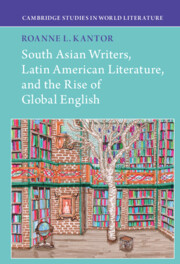Book contents
- South Asian Writers, Latin American Literature, and the Rise of Global English
- Cambridge Studies in World Literature
- South Asian Writers, Latin American Literature, and the Rise of Global English
- Copyright page
- Dedication
- Contents
- Figures
- Acknowledgments
- Introduction
- Chapter 1 Transmigrant
- Chapter 2 Stranger
- Chapter 3 Displacee
- Chapter 4 Pilgrim
- Chapter 5 Revenant
- Epilogue
- Notes
- References
- Index
Epilogue
Published online by Cambridge University Press: 17 February 2022
- South Asian Writers, Latin American Literature, and the Rise of Global English
- Cambridge Studies in World Literature
- South Asian Writers, Latin American Literature, and the Rise of Global English
- Copyright page
- Dedication
- Contents
- Figures
- Acknowledgments
- Introduction
- Chapter 1 Transmigrant
- Chapter 2 Stranger
- Chapter 3 Displacee
- Chapter 4 Pilgrim
- Chapter 5 Revenant
- Epilogue
- Notes
- References
- Index
Summary
The Epilogue weaves together disparate strands of resistant, worldly thinking under the aegis of Latin America. The scholar Taymiya Zaman uses Julio Cortázar and Jorge Luis Borges to decolonize the writing of history. The novelist Karan Mahajan references Bolaño to demand that American readers to approach his version of India on its own terms. And two writers – the despondent Tanuj Solanki and the hopeful Mohsin Hamid – invoke the countershelf at the end of the world.
Keywords
- Type
- Chapter
- Information
- Publisher: Cambridge University PressPrint publication year: 2022

